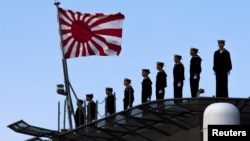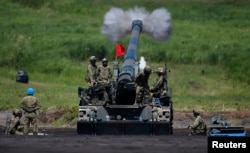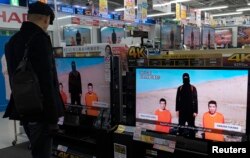In Japan, opponents of recently enacted security measures that authorize the military to fight abroad are growing increasingly concerned about getting drawn into a military conflict with Islamic State militants.
“There are people who say that Japan should be more fully engaged in the U.S. or France-led war on terror, but on the other hand there are people who say that this is all the more reason why Japan can contribute to greater peace in a different way,” said Koichi Nakano, a professor of political science at Sophia University in Tokyo and vocal critic of the security measures.
Japan is a member of the U.S.-led coalition of 65 countries that is fighting IS in Iraq and Syria, but its contribution so far has been non-military with Prime Minister Shinzo Abe pledging $200 million earlier this year in humanitarian aid and medical supplies.
Authorities in Tokyo, however, said Monday they will increase counterterrorism cooperation with the United States following President Barack Obama’s televised address in which he condemned last week's shooting rampage in California as an “act of terrorism.”
"Our country will continue efforts to prevent terrorism in close cooperation with the United States and the international community," said Japan’s Chief Cabinet Secretary Yoshihide Suga.
Japan will set up intelligence gathering operations in diplomatic missions in Southeast Asia, South Asia, the Middle East and North and West Africa.
Reaction to attacks
The shooting by two Islamic militants in San Bernardino, California killed 14 people and wounded 21 others. It followed the deadly Nov. 13 terrorist attacks in Paris that killed 130 people. Also in London Saturday, police subdued a knife-wielding assailant that wounded a man in a subway train station after he reportedly shouted, “this is for Syria.” Authorities are calling the attack a “terrorist incident.”
Japan’s National Police Agency Friday ordered stronger anti-terrorism measures be taken and increased security at facilities that draw large crowds. The agency also actively sought public cooperation in preventing terror attacks.
Prime Minister Abe and his conservative supporters have been strong proponents of increasing the scope and power of Japan’s military to counter potential threats.
The security bills passed in September revised 10 existing laws and gave the military more latitude to defend its people and interests, to participate in collective self-defense and defend allies like the United States.
Supporters cite China’s growing military power in the region and North Korea increasing nuclear capabilities as the main justification for expanding Japan’s military role beyond the constraints of its post-World War II pacifist constitution.
Japanese vulnerability
The beheading of two Japanese citizens earlier this year, claimed by the Islamic State group, and the deaths of 10 others in a hostage crisis in Algeria in 2013 have highlighted the vulnerability of Japanese people abroad. Abe said if the expanded security measures had been in place earlier, he would have sent Japanese Self Defense forces to rescue the Japanese hostages.
The security legislation remains controversial with over 50 percent of Japanese opposed to it. Opponents believe it will lead inevitably to increasing Japanese military involvement in Middle East conflicts.
“The possibility that Japan may now be asked by the U.S. leaders to provide what’s called logistical support to the U.S. troops would of course expose Japan to greater danger and perhaps aggravate the terrorist threat,” said Professor Nakano
Japan has also upgraded its intelligence-gathering capability, including launching satellites to monitor North Korea, which has carried out nuclear tests and routinely threatens Japan.
The country is also making a point of showing that it is increasing security as it prepares to host the next G7 summit in May, as well as the Summer Olympics in 2020.













